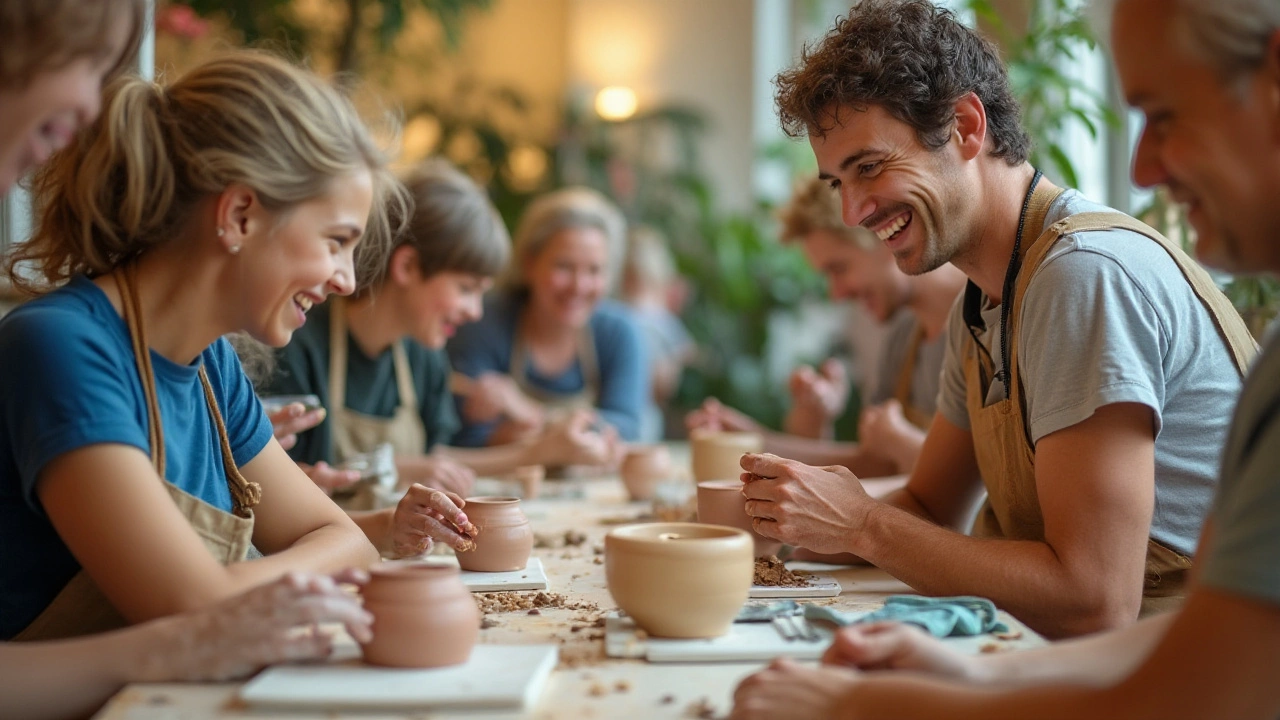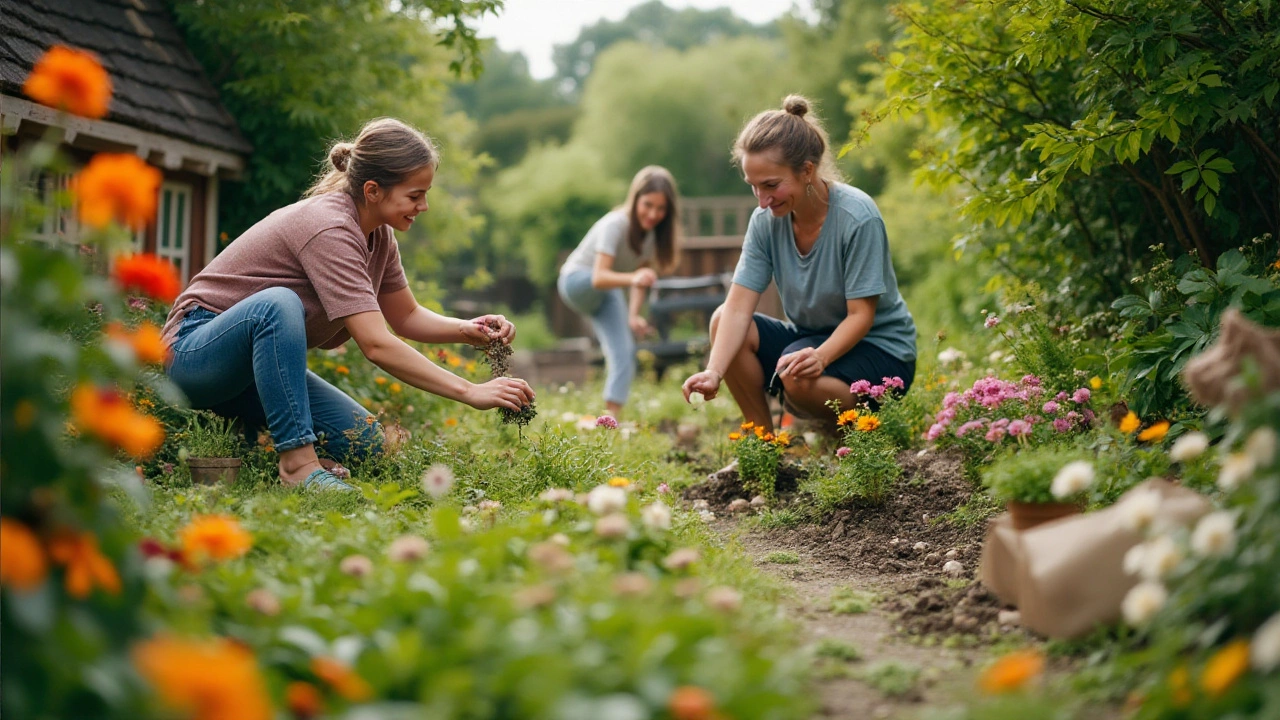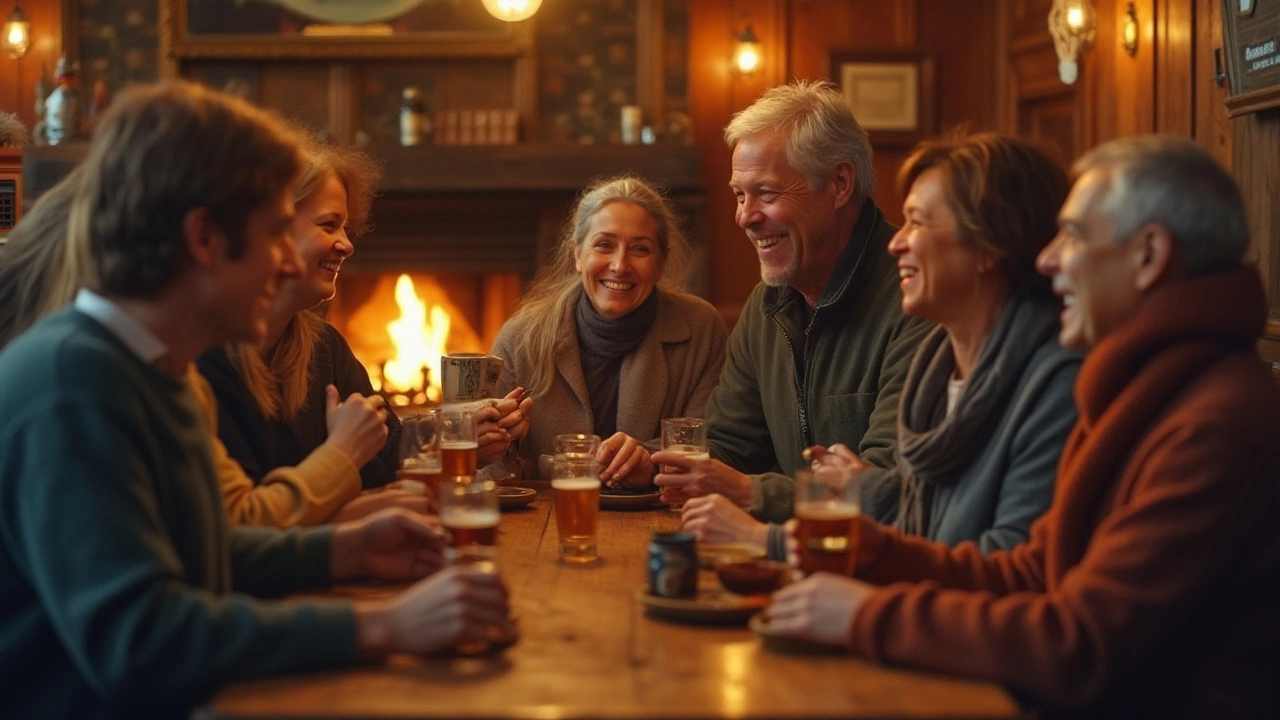For adults, making new friends can sometimes feel as daunting as a first day at school. Between hectic schedules and established routines, it's easy to see why forming fresh connections becomes increasingly rare as the years go by.
Yet, social clubs stand as beacons of opportunity within this landscape. These gatherings, founded on shared interests or goals, create an atmosphere ripe for the growth of new friendships. Anchored in common passions, clubs are less about forced small talk and more about genuine conversation and shared experiences.
This article explores where adults most frequently make those crucial friendships and how social clubs serve as the perfect backdrop for forming lasting bonds.
- The Modern Challenge of Making Friends
- Why Social Clubs Work
- Types of Social Clubs
- Success Stories: Real-Life Encounters
- Tips for Joining a Club
- Beyond the Club: Maintaining Friendships
The Modern Challenge of Making Friends
In today’s bustling world, the challenge of forming meaningful adult friendships is one that looms large for many. The structure of modern life, with its relentless pace, often shapes a scenario where meeting new people outside of professional or digital spheres is a rarity. Our routines, dominated by work commitments, family responsibilities, and the allure of a digital lifestyle, leave little room for cultivating new connections. This is especially true considering that adults, on average, spend ninety percent of their lives indoors, according to Harvard's School of Public Health. The limited exposure to new social settings naturally poses a challenge in meeting new people, leading many adults to question how to nurture friendships beyond the occasional 'like' or comment online.
The dynamic, however, wasn't always this way. During childhood and adolescence, making friends is practically an inherent part of a person’s daily routine. Schools, after-school activities, and team sports all create environments where individuals naturally interact. For adults, the lack of structured environments for social interaction can often stall the creation of new friendships. Without the external provisions of shared experiences like school or college, finding common ground with strangers often demands conscious effort, something easily postponed in the face of busy schedules.
Social clubs present themselves as a remedy to this, offering fertile ground for friendships. They gather individuals around shared passions or hobbies, establishing a foundation that makes it easier to bridge the gap between unfamiliarity and friendship. Whether university alumni groups, dance classes, book clubs, or even community gardens, these clubs extend an opportunity that transcends age, background, or profession, allowing friendships to blossom from mutual interests rather than coincidental circumstances. In a study conducted by Dunbar, the renowned Anthropologist from Oxford University, findings suggest that maintaining friendships involves a conscious investment of time, something social clubs are ripe for.
"It's crucial to realize that adult friendships won't just happen organically," explains Psychologist Robin Dunbar of Oxford University. "They require effort and occasions for meeting—that's where social clubs can truly shine."Today's adults must navigate digital realms along with real-life situations, balancing both without letting one overshadow the other. As screens grow smaller and more portable, the pull of digital spaces, with their airbrush-filtered ease and curated realities, can steal time and attention away from building real-life connections. The more time spent online, the less time there is for real-world interactions, potentially leading to feelings of isolation. Recognizing and resolving these trends can pave the way for meaningful adult friendships, grounded in real-world commonalities and interactions. Social clubs anchor these opportunities firmly in reality, offering a restorative antidote to an otherwise ephemeral connection in the digital age.
Why Social Clubs Work
Social clubs are like melting pots of diversity, blending together people from various walks of life under the umbrella of shared interests. One reason these clubs thrive as environments for friendship is their ability to provide a sense of community. Adults often face the challenge of limited social interactions, with work and family taking precedence. Social clubs offer a dedicated space where individuals can invest time in themselves and their passions. This setting eases the pressure off typical socializing, letting friendships develop naturally through shared experiences and organic conversations.
The structure of these clubs often encourages regular meetings, be it weekly or monthly, which facilitates consistent interaction. This regularity is key to nurturing relationships. When people see each other frequently, it builds a foundation of trust and familiarity. Such establishments range from book clubs to gardening associations, each offering its distinct flavor of interaction, bringing together people whose paths might otherwise never cross. Social clubs work because they tap into the innate human desire for belonging; they provide a space to be a part of something bigger than oneself.
Social psychologist Matthew Lieberman suggests that humans are wired to connect, and social clubs harness this aspect adeptly. They naturally break down barriers since everyone there has a common interest. These environments remove the awkwardness often associated with meeting new people. As club members collaborate on projects, plan events, or simply share stories over coffee, they foster a sense of camaraderie. In a study by the Harvard Study of Adult Development, it was found that good relationships keep people happier and healthier.
"People who are more socially connected to family, to friends, to community, are happier, and they're physically healthier," says Dr. Robert Waldinger, the study's director. "The quality of your relationships matters."This highlights how crucial these clubs can be for both psychological well-being and physical health.
Moreover, social clubs often provide a non-competitive environment, making them a safe space for personal growth and experimentation in social dynamics. In contrast to work or networking events where the stakes can feel high, clubs let adults practice social skills without fear of failure. If a conversation doesn’t flow, the club meeting isn’t over; there are still activities to engage in and other people to meet. It's also interesting to note the rise of niche social clubs, such as urban foraging or retro gaming, which cater to more specific interests and draw together highly passionate individuals. These niches are especially fruitful because they merge people who are deeply enthusiastic about a specific interest, making connections even more profound and genuine. A survey by Social Club Hub in 2023 indicated that 75% of participants felt more connected and less isolated after joining a social club, underscoring their crucial role in adult friendships.

Types of Social Clubs
From knitting circles to photography meetups, social clubs offer countless varieties catering to every interest imaginable. These clubs are made up of individuals who come together due to a shared hobby, passion, or activity, each harnessing its own unique charm. Some of the most popular types include sports and fitness clubs, arts and crafts groups, hobbyist collectives, and volunteer organizations. Fitness clubs, for example, might include everything from cycling enthusiasts to yoga practitioners, each welcoming beginners and veterans alike to sweat and socialize together.
Arts and Crafts groups provide not only a creative outlet but an opportunity to learn from and teach peers, facilitating friendships across skill levels. The hobbyist collectives could be a treasure trove of enthusiasts, ranging from book club participants to tabletop gaming aficionados. Volunteer organizations, on the other hand, attract people who wish to give back to their communities, fostering bonds over shared altruistic goals.
Interestingly, a survey once revealed that around 36% of adults had formed close friendships within clubs focused on their favorite pastimes. This statistic highlights just how effective these social clubs are in breaking the ice and providing the groundwork for meaningful interactions.
A study conducted by Professor John Cacioppo from the University of Chicago stated, "Shared activities are a cornerstone of adult friendships; engaging together in something you are passionate about lays a strong foundation for connection."
Now, let's not forget niche clubs that offer tailored experiences. Whether it's a cheese tasting club for gastronomes or a vintage car restoration group for gearheads, these more specialized circles offer a tight-knit environment where one not only shares interests but also cultural or lifestyle nuances. This specificity often leads to deeper connections as members relate on more intricate levels, beyond the surface of a shared interest.
Of course, joining these clubs isn't just about attending events; it's about involving oneself in the community. Many clubs have committees or leadership roles that one can be a part of, giving members the chance to shape experiences, widen their social circles, and strengthen those burgeoning friendships. With such a vast array of adult friendships materializing through these clubs, it's clear why many individuals find their lifelong friends within them.
Success Stories: Real-Life Encounters
In the realm of social interactions, social clubs serve as vibrant settings where adult friendships come to life. Let us turn our attention to the experiences of individuals who have found new meaningful connections within these dynamic environments. Take, for instance, the tale of Jamie, a tech entrepreneur from Glasgow, who joined a local cycling club. With a history of long hours spent in solitude upon his laptop, Jamie craved camaraderie that didn’t merely revolve around work engagements or superficial conversations. Through weekly cycling meet-ups, he not only improved his fitness but also encountered a diverse group of people. What began as shared laughs over grueling hill climbs gradually evolved into hearty group dinners and weekend expeditions, creating a network of friends that extended beyond mere cycling enthusiasts.
With Jamie's story in mind, consider yet another shining example: Anya, an art historian in Leeds. Moving to a new city for work left her feeling isolated and disconnected, despite being surrounded by vibrant cultural scenes. To bridge this gap, she joined an art appreciation club that met each month to explore both classic and contemporary works. These meetings became a platform for deeper dialogue, enriching Anya's understanding of art. Beyond that, the club's informal meetups fostered personal connections. Anya’s evenings soon filled with art strolls, spirited debates, and shared visits to art galleries. This network of friends, all united by a shared cultural enthusiasm, quickly became Anya's support system in her new home.
To further paint the picture, one can look at the story of Chris and Riley, two strangers who met at a community gardening club in Manchester. Chris, a seasoned horticulturist, joined initially to breathe life into underutilized urban spaces but soon found an unexpected ally in Riley, who came with solely the curiosity to learn. What started as mutual mentoring on soil and seeds blossomed into a deep friendship rooted in shared weekend labor and creative projects for the community garden. Their collaboration not only transformed a barren plot into a lush sanctuary but also seeded a flourishing friendship, demonstrating the power of club interactions to cultivate human bonds.
These stories illustrate the profound impact of social clubs on adult friendships. Each encounter underscores the principle that shared interests naturally lead to shared experiences, creating spaces for real connections. As the American psychologist, Abraham Maslow, once stated,
"In any given moment we have two options: to step forward into growth or step back into safety.”By stepping into these clubs, individuals open themselves up to growth, inadvertently laying groundwork for friendships that enrich lives both personally and socially.
Various statistics back up this narrative. According to a recent survey by Meetup, over 75% of users reported they felt more connected to their community after joining local clubs. Another report from the Happiness Research Institute highlighted that individuals participating in clubs or group activities have higher happiness indices compared to those who do not. This data serves as compelling encouragement for those hesitant to join, attesting to the social and emotional benefits inherent in club participation.
In reflecting on these examples, one thing stands out: Social clubs are not merely venues for placing people in the same room. They are catalysts for shared journeys, nurturing not only the mutual interests that initially bring members together but also the friendships that, as a result, grow and thrive. For those seeking new connections, these stories provide earnest hope and preciously needed inspiration, reinforcing the idea that friendship, at any age, is always within reach when one dares to step forth into new shared landscapes.

Tips for Joining a Club
Diving into the world of social clubs can seem slightly intimidating at first, yet the rewards are often worth the initial nerves. Adults often make friendships through shared activities and interests, so choosing the right club is crucial. Start by pondering your passions and what you’d like to explore. Whether it’s photography, gardening, or book discussions, aligning your club choice with personal interests can significantly enhance the experience. If you love being outdoors, consider hiking or cycling groups. For those with a creative flair, arts and crafts clubs offer an expressive outlet.
Once you've narrowed down your interests, research the clubs in your local area. Websites like Meetup and Facebook groups are a great resource. They list various clubs along with upcoming events and can give you an excellent perspective on what each club offers. You might want to visit a few before deciding, as each club has a different vibe and dynamic. Observe how members interact with newcomers. Are they welcoming? This initial observation can provide you with an idea of how you might fit in.
Next, it’s time to make that leap. Contact the club representative to express interest, or if possible, attend a meeting or event as a guest. Participating in an event not only allows you to gauge the club’s atmosphere but also gives you a chance to meet potential new friends. Feel free to ask questions about the club's history, core activities, and the type of people who typically join. In the words of anthropologist Robin Dunbar, "The people you click with are more likely to introduce you to their friends"; therefore, establish connections whenever possible.
One key aspect to consider is commitment. Some clubs require regular attendance, while others may be more flexible. Ensure that your schedule can handle this new addition without making you feel overwhelmed. It’s not just about adding another routine; it's about enriching your social life and creating a path to make enduring friendships with like-minded, passionate adults.
Finally, keep an open mind during your initial interactions. Friendships blossom when we step outside our comfort zones and embrace diversity. Adults often find new friends in unexpected places, and a social club is no exception. You might meet people from different walks of life and varied backgrounds, each bringing their own unique stories and experiences to the table. These interactions will not only broaden your horizons but enrich the club itself.
"The more connections you make, the easier it becomes to form new acquaintances," says psychologist Susan Newman. "Clubs are fertile ground for friendships to grow."
Once you’re comfortable, consider taking on a more active role within the club. Volunteering for events or offering assistance with club activities can help build your status within the group. This involvement shows dedication and encourages deeper connections with other members. Remember, the more effort you invest, the more rewarding your social club experience will be.
Beyond the Club: Maintaining Friendships
Once the initial excitement of joining a social club fades, maintaining the friendships formed there becomes an important aspect of nurturing these new connections. The camaraderie and rapport built in club meetings provide a solid foundation, but sustaining them requires conscious effort and commitment. Consistency is key, ensuring that you remain a familiar presence even outside of club gatherings. Strategies like regular calls, texts, or social media interactions can be instrumental. For example, creating a group chat for your club members allows you to share updates, plan impromptu meet-ups, or simply exchange a good meme to keep the communication alive.
Investing time in shared activities beyond the club setting can act as a natural progression for your friendships. Engaging in hobbies, dining together, or planning day trips offers opportunities to bond over new experiences. Sharing a deeper layer of personal interests or life stories during these encounters solidifies the connection. Remember, being genuine and open-hearted encourages others to reciprocate. A recent survey found that adults who engage in such activities outside of work and club settings are 25% more likely to develop long-lasting friendships. This statistic underscores the significance of interaction beyond structured environments.
A meaningful friendship often demands vulnerability, and it's essential to be present not just physically but emotionally, too. This means showing up for each other during both joyous and challenging times. Supporting a friend through a career change, a personal loss, or celebrating personal achievements further cements the bond. Social psychologists have long emphasized that mutual emotional support is a cornerstone of enduring friendships. "Friendship is born at that moment when one person says to another: 'What! You too? I thought I was the only one.'" –
C.S. Lewis
Reflect on what has already worked well in your dynamic. Was it the late-night conversations, or perhaps the hobby you both couldn’t stop talking about? Keep nurturing these elements. They hold the potential to transform a shared club activity into a lifelong friendship. Remember that every relationship requires balance and mutual respect. This might mean giving space when needed or ensuring communication is a two-way street.
In the end, the adult friendships you cultivate through social clubs can grow richer when you actively invest time and energy beyond the club walls. Whether you organize a regular book club, plan a surprise birthday gathering, or embark on a weekend hiking trip, maintaining friendships is about continuing the story you started within the club.
